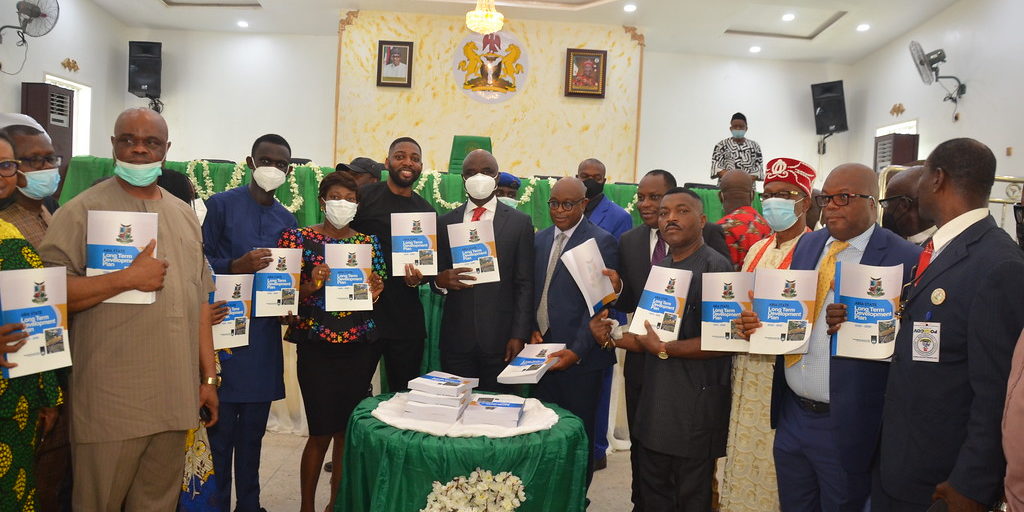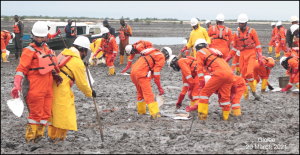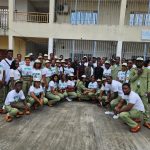
Launching a 30-Year Growth and Development Plan: The Abia State 30-Year Long Term Plan (2020-2050)
April 13, 2021
A Story of 4,355 Vulnerable Niger Delta Youth Equipped with Market Relevant Skills
April 19, 2021
The Bodo Cleanup Project is the largest oil spill cleanup ever undertaken in the Niger Delta. Also, the planned revegetation of nearly 1000 hectares, will be the largest mangrove restoration resulting from oil contamination in the world. Over 2400 men and women from Bodo will be involved over the life of the Project.
The Project is also unique in requiring three sets of 800 field workers to be trained and deployed, each group having employment for roughly 10 months. The contribution to the community of worker’s income earned directly from the Project is substantial, as well as capacity building and skills acquired in oil-spill response.
The transition from Group 1 to Group 2 started in February 2021 with a medical fitness test for all workers expected on the project. Successful candidates were swim certified given the work area of the cleanup project. Over the past several weeks, implementation of Group 2 training has been in progress. Training consists of two parts, classroom lectures and videos following the curriculum established by the International Maritime Organization (IMO) for First Responders (Level 1) and field-oriented training to provide workers with an understanding of the equipment and hands-on requirements of the job. All workers received this level of training following Covid-19 protocols and guidelines for group size. IMO training is internationally certified and serves as an entryway to work on other related cleanup projects in the Niger Delta and elsewhere.
To further prepare the 800 workers for start of field cleanup operation, a Health, Safety Security and Environment (HSSE) induction was carried out to educate all candidates on the need to work safely without injury (Goal Zero). Various HSSE trainers were mobilized to train the workers in groups and batches. The HSSE lead for the Ogoni Restoration Project (ORP), Mr. Isaac Erigi, in his comments stated thus: “the essence of the occupational safety induction is to ensure the workers get informed about the potential hazard and threats associated with the cleanup and remediation project, and also on how to mitigate these risks when faced with them on site. We have inducted 800 community workers for the batch 2 of the cleanup project”. He went further to commend all participants for their cooperation in ensuring that the program was successful.
Field training on oil collection using sorbent pads. | Photo: Giolee Global Resources Ltd.
Mr. Gideon Sagah, one of the beneficiaries of the second batch expressed enthusiasm over the start of work for the new set. In his remark, he said: “I am very happy to have been nominated for the cleanup project. I believe that the screening and IMO training I and my colleagues have being made to undergo, is such that if upscaled, it can enhance our employability. I have learnt the essentials required for remediation in a swampy area. If given further opportunity, I will put my skills to work for a successful cleanup. I am open to learning new things and I anticipate starting on the work already”.
Of the 800 workers, 80 were selected for more-advance, Level 2 IMO training for supervisors and on-scene commanders, designed to provide more hands-on training for cleanup supervisors for the Project.
The second group of workers have been deployed starting 5 April 2021. The pioneer group of workers for the Phase 2 cleanup project ended work the week before, – having worked for about 10 months starting at its inception in November 2019. The Project had a temporary pause in April 2020 and only restarted in November 2020 after the lockdown due to COVID-19 pandemic. We commend the hard work of the first group of workers and now welcome the participation of the second batch.










